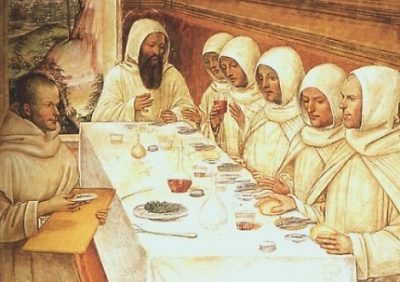Sumebant cibum cum exsultatione (XLIII:2)

CHAPTER XLIII. Of those who come late to the Work of God, or to table
23 Mar. 23 July. 22 Nov.
If any one, through his own negligence and fault, come not to table before the Verse, so that all may say this and the prayer together, and together sit down to table, let him be once or twice corrected. If after this he do not amend, let him not be admitted to share in the common table, but be separated from the companionship of all, and eat alone, his portion of wine being taken from him, until he hath made satisfaction and amends. Let him be punished in like manner, who is not present also at the Verse which is said after meals. And let no one presume to take food or drink before or after the appointed hour: but should a brother be offered anything by the Superior, and refuse to take it, if he afterwards desire either what he before refused, or anything else, he shall receive nothing whatever, until he hath made proper satisfaction.
The liturgy of the refectory is sacred; the rubrics that govern it safeguard its Eucharistic character so that the words of the Apostle may be rightly fulfilled in the monastery day after day: “Whether you eat or drink, or whatsoever else you do, do all to the glory of God” (1 Corinthians 10:31). All are to come to refectory without delay and in time for the verse and the prayer, and all, says Saint Benedict, are to sit down together at table. A Benedictine monk never “grabs a bite” or eats in an individualistic manner. He enters into the liturgical order of the refectory, before, during, and after the meal, taking care to conform to the corporate actions of the whole community. One who despises the liturgy of the common table will be separated from it and even deprived of his portion of wine—a terrible punishment for the Mediterranean man—in order to be brought to his senses.
Saint Benedict would have no one of his monks presume to take food or drink before or after the appointed hour. Why this prohibition? Saint Benedict wants to preserve, at all times, the social character of taking food or drink. If food or drink are permitted between meals, it is a concession to human weakness. One should receive such a concession humbly and gratefully, at the same time and in the same way as others. The monk who wants to eat and drink on his own terms, and at the time he chooses, risks falling into the kind of individualistic and antisocial behaviour that empties eating and drinking of their sacramental and Eucharistic significance. Nothing is more antithetical to the Benedictine ethos of the table than the “fast food” trends that, in recent decades, have imposed themselves on every culture.
When one studies the history of monastic reforms, one discovers that among the first measures taken to restore vigour and discipline is the restoration of the common table and of the liturgy that renders it sacred. One of the recurrent signs of monastic decadence is the trend to individualise the table fare so as to cater to the palate of each one and, then, to adjust the time of meals to each one’s appetite or fancy, and, finally, to organise room service. I do not speak here of the care of the infirm — the sick are to be treated as Christ Himself — but of the slow and pernicious movement away from the common life. After the Opus Dei, the Holy Sacrifice of the Mass, and the daily Chapter, nothing more effectively consecrates and manifests the apostolic character of the monastic life than the common table.
They persevered with one accord, day by day, in the temple worship, and, as they broke bread in this house or that, took their share of food with gladness and simplicity of heart, praising God, and winning favour with all the people. And each day the Lord added to their fellowship others that were to be saved. (Acts 2:46–47)
In practice, it is always permitted to take some refreshment at mid–morning and mid–afternoon. This means breaking from work, making the sign of the cross before eating and drinking, and returning to work promptly as soon as one has taken one’s refreshment,. It is not permitted to linger in conversation or to delay one’s return to the work at hand. There is a general permission to take a hot or cold drink at various times during the day, but even this with moderation. Having a cup of tea or coffee must never become a way of delaying one’s work or of foreshortening the time allotted to it.
Saint Benedict ends this chapter with a warning against spiritual pride. There will always be the temptation for some to cast themselves in the role of the self–denying ascetic by refusing the indulgences to human weakness offered to others. Saint Benedict unmasks the self–sufficiency and arrogance at the root of such an attitude. The Benedictine way is to receive all good things with a grateful heart.
Always rejoice. Pray without ceasing.In all things give thanks; for this is the will of God in Christ Jesus concerning you all. (1 Thessalonians 5:16–18).
